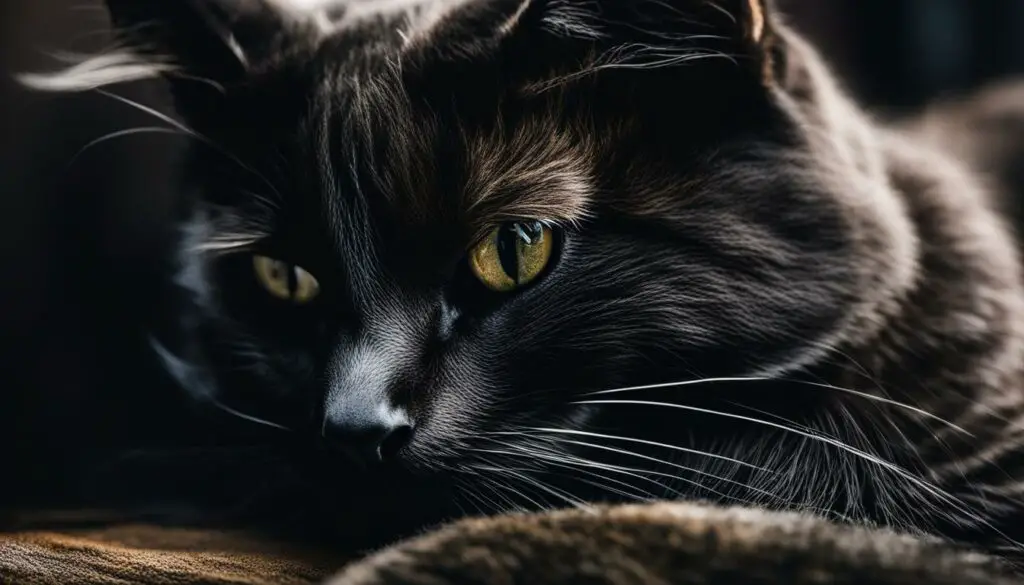As a cat owner, I’ve often come across black stuff on my furry friend’s nose. At first, I didn’t give it much thought, assuming it was just normal cat dirt. But then, curiosity got the better of me, and I decided to delve deeper into this fascinating subject.
So, what exactly are these cat black boogers, and should we be concerned about them? Let’s take a closer look.
Key Takeaways:
- Black stuff on a cat’s nose can be caused by boogers, mucous nasal discharge, dust, or scabs.
- It can also be a sign of bacterial infection, feline herpes, or Lentigo.
- Regular cleaning and observation are necessary to ensure the cat’s well-being.
- Cleaning a cat’s nose should be done gently on the outside, never inside the nasal passage.
- If your cat has excessive black boogers or eye boogers, it’s best to consult a veterinarian.
What Causes Black Stuff In My Cat’s Nose
When you notice black stuff in your cat’s nose, it’s important to understand the possible causes. In many cases, it could be simply from lint and dust that has accumulated from dark sources like black clothing or furniture. Cats love to explore their surroundings, and these particles can easily stick to their noses. Additionally, if you have multiple cats, territorial behavior could result in black marks on their noses, especially if they engage in gentle play or grooming activities.
Besides lint and dust, there are other potential causes for black stuff in your cat’s nose. One possibility is Lentigo, a condition characterized by small areas of hyper-pigmentation. Although Lentigo is harmless and doesn’t pose health risks to your cat, it can contribute to the appearance of black spots on their nose. Another potential cause is a bacterial infection, which could alter the color of the mucous discharge.
It’s crucial to pay attention to any changes in your cat’s nose, as certain conditions may require veterinary intervention. If you notice sudden or excessive black stuff, persistent nasal discharge, or other concerning symptoms, it’s recommended to consult with a veterinarian for a proper diagnosis and appropriate treatment.
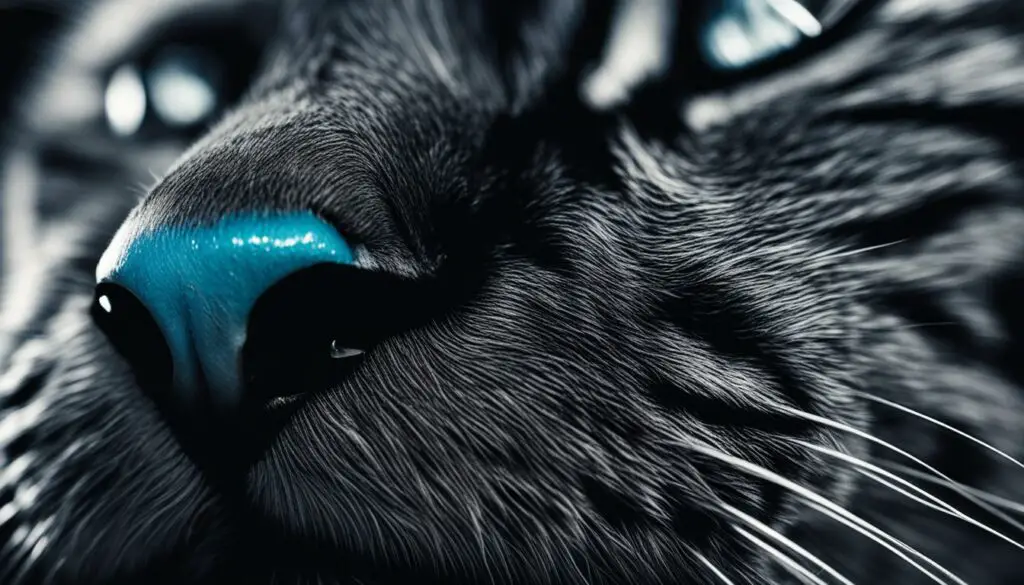
What Causes Black Stuff In My Cat’s Nose:
| Possible Causes | Description |
|---|---|
| Lint and Dust | Particles from dark sources like clothing or furniture can accumulate on a cat’s nose. |
| Lentigo | The development of small areas of hyper-pigmentation can result in black spots on a cat’s nose. |
| Bacterial Infection | An infection may cause a change in the color of the nasal discharge. |
Regular observation and cleaning of your cat’s nose can help maintain their health and well-being. Always remember to be gentle and avoid inserting any objects into their nasal passages. If you have any concerns about your cat’s nose, consult with a veterinarian for professional guidance and advice.
Is Cat Lentigo Simplex The Cause Of Black Spots On A Cat’s Nose?
When it comes to black spots on a cat’s nose, one potential cause is a condition called cat lentigo simplex. Lentigo refers to the development of small areas of hyper-pigmentation, which can result in black spots on the nose. While this may sound alarming, it is actually a harmless condition that does not affect the cat’s overall health. In fact, it is quite common in certain cat breeds.
Cat lentigo simplex typically manifests as black spots that increase in number over time. These spots are often flat and round in shape, resembling freckles. They can vary in size and may be accompanied by other areas of hyper-pigmentation on the cat’s skin. However, it’s important to note that lentigo simplex does not cause any discomfort to the cat and does not require any specific treatment.
It’s worth mentioning that cat lentigo simplex is more commonly seen in cats with dark pigmentation, such as black or tuxedo cats. Breeds like Siamese, Burmese, and Bombay cats are known to be more prone to this condition. If you notice black spots on your cat’s nose, especially if they are increasing in number, lentigo simplex may be the cause. However, it is always advisable to consult with a veterinarian for an accurate diagnosis and to rule out any other potential causes.
| Breed | Likelihood of Cat Lentigo Simplex |
|---|---|
| Siamese | High |
| Burmese | High |
| Bombay | High |
| Other Breeds | Low |
In conclusion, cat lentigo simplex can indeed be the cause of black spots on a cat’s nose. It is typically a harmless condition that does not require any specific treatment. However, it is always best to consult with a veterinarian to confirm the diagnosis and ensure the cat’s overall health and well-being.
More Serious Causes of Black Stuff on Your Cat’s Nose
While black stuff on a cat’s nose can sometimes be harmless, there are more serious causes that should not be ignored. Two common culprits are bacterial infections and feline herpes. These conditions can lead to changes in the color of the mucous discharge and persistent nasal discharge, respectively. If you notice sudden, excessive nasal discharge or if it is accompanied by other symptoms, it is important to consult a veterinarian for further evaluation.
Bacterial infections can result from a variety of factors, including foreign objects in the nasal passage or an underlying illness. They can cause the mucous discharge to become discolored, often appearing yellow or green. Feline herpes, on the other hand, is a viral infection that can cause persistent nasal discharge, sneezing, and conjunctivitis. It is important to seek veterinary care if you suspect your cat may be suffering from either of these conditions.
Additionally, it is worth mentioning that black stuff on a cat’s nose can sometimes be a sign of more serious underlying health issues. These can include nasal tumors, polyps, or other respiratory disorders. If you observe any changes in your cat’s behavior, appetite, or overall well-being, it is essential to seek professional veterinary advice for a comprehensive evaluation.
Possible Causes of Black Stuff on a Cat’s Nose
| Possible Causes | Symptoms |
|---|---|
| Bacterial Infection | Discolored mucous discharge |
| Feline Herpes | Persistent nasal discharge, sneezing, conjunctivitis |
| Nasal Tumors | Changes in behavior, appetite, overall well-being |
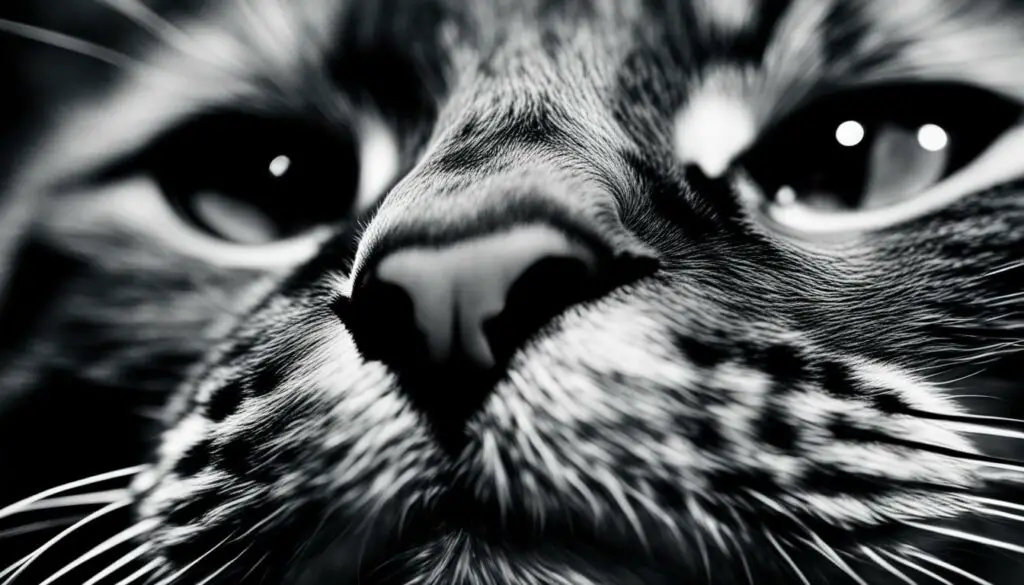
“Any changes in your cat’s behavior, appetite, or overall well-being should be taken seriously and brought to the attention of a veterinarian.”
Remember, it’s important to observe your cat closely and seek prompt veterinary care if you notice any concerning symptoms. By addressing these more serious causes of black stuff on your cat’s nose, you can ensure their health and well-being.
Should I Clean My Cat’s Nose?
Keeping your cat’s nose clean is an essential part of their overall health and hygiene. While some cats may require occasional cleaning due to allergies or other factors, it’s important to approach this task with caution to avoid discomfort or injury to your furry friend.
Cleaning your cat’s nose should be done gently and only on the outside. Avoid going inside the nasal passage, as this can be uncomfortable and potentially harmful to your cat. Instead, use a soft material, such as a cotton ball or a soft cloth, dipped in clean, warm water to wipe the outer surface of the nose.
Regular cleaning can help remove any accumulated dust, dirt, or dried mucus that may be present on your cat’s nose. This can also help prevent the formation of black boogers. However, it’s important to note that excessive cleaning or aggressive wiping can irritate your cat’s sensitive skin, so be sure to approach the task with a gentle touch.
| Cleaning Your Cat’s Nose | Tips |
|---|---|
| Use a soft material | Choose a cotton ball or soft cloth for cleaning. |
| Dip in clean, warm water | Moisten the material with water that is neither too hot nor too cold. |
| Gently wipe the outside | Wipe the outer surface of your cat’s nose, avoiding the nasal passage. |
| Be gentle | Handle with care to avoid discomfort or injury to your cat. |
| Monitor the cat’s reaction | Observe your cat’s behavior during the cleaning process and stop if they show signs of distress. |
Remember, if you’re unsure about cleaning your cat’s nose or if your cat has excessive black boogers, it’s always best to consult with your veterinarian. They can provide guidance and ensure your cat’s nose stays clean and healthy.
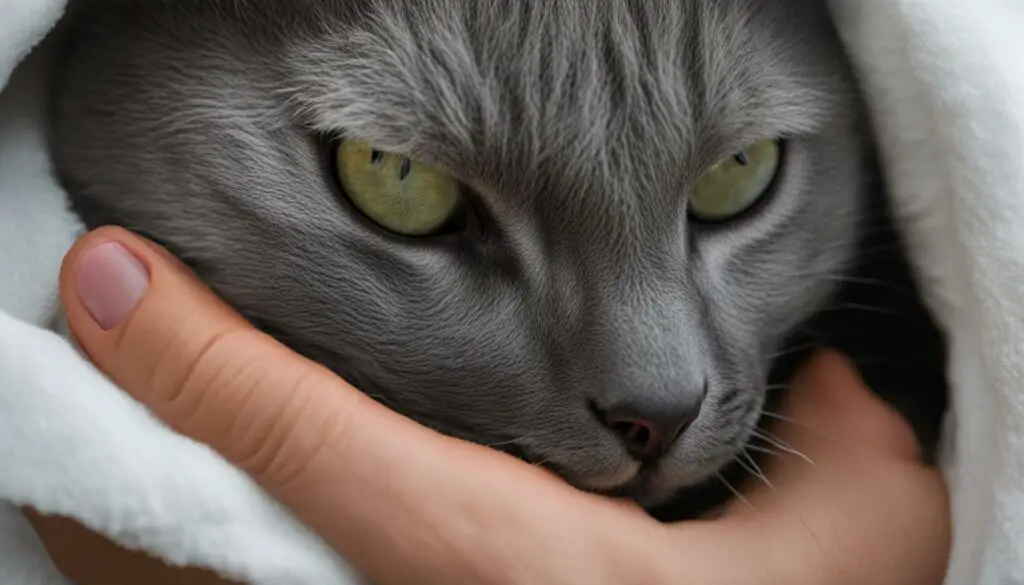
What About Cat Boogers?
When it comes to our feline friends, it’s not uncommon to come across a little something called cat boogers. These dried mucus or discharge particles can be found in a cat’s nose and may require some attention to ensure our kitties are comfortable and healthy.
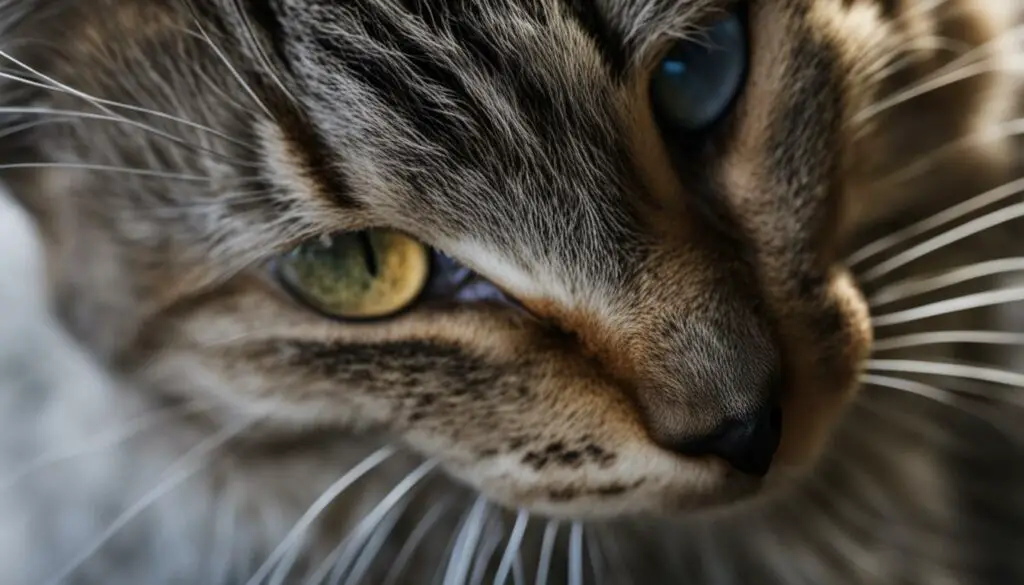
So, how should we handle these cat boogers? Well, the key is to be extra careful when cleaning our cats’ noses to avoid scratching or hurting them. To clean their nose, you can use a soft material, like a cotton ball or a damp cloth, and gently wipe the outside of the nose. It’s important to emphasize the gentle part, as we don’t want to cause any discomfort to our furry friends.
Remember, always use clean, warm water and avoid going inside the nasal passage. Cleaning the outside of the nose is sufficient to remove any dried mucus or discharge. By taking these small steps, we can help keep our cats‘ noses clean and their boogers at bay.
How Should I Clean My Cat’s Nose
Cleaning your cat’s nose is a simple and important part of their overall hygiene. To keep your cat’s nose clean and free from any black stuff, follow these easy steps:
- Gently moisten a soft material, such as a cotton ball or clean cloth, with warm water.
- Hold your cat gently and position the moistened material near their nose.
- Using gentle strokes, wipe the outside of their nose, removing any visible dirt or debris.
- Be sure to avoid any contact with their sensitive inner nasal passage.
Cleaning your cat’s nose once a week is generally sufficient for a healthy cat. However, if your cat has allergies or requires more frequent cleaning, consult with your veterinarian for specific guidance. Regular cleaning helps prevent the buildup of black stuff and ensures your cat’s nose stays clean and healthy.
“Regular cleaning helps prevent the buildup of black stuff and ensures your cat’s nose stays clean and healthy.”
Remember to always be gentle and considerate when cleaning your cat’s nose. Avoid scratching or hurting them in any way. If you’re unsure or uncomfortable with cleaning your cat’s nose yourself, don’t hesitate to seek advice from a professional groomer or your veterinarian. They can provide you with additional tips and demonstrate proper cleaning techniques.
| Benefits of Cleaning Your Cat’s Nose | Precautions When Cleaning Your Cat’s Nose |
|---|---|
|
|
By practicing regular nose cleaning, you can help ensure your cat’s nose remains clean and free from any black stuff. It’s a small but important step in keeping your cat healthy and happy.
What Can I Give My Cat for Nasal Congestion
Dealing with a cat’s nasal congestion can be a concern for pet owners. While it’s always essential to consult a veterinarian before giving any medication to your cat, there are a few remedies you can try at home to help alleviate their nasal congestion.
Plain Saline Solution
One option is to use a plain saline solution. This can be easily made by mixing a quarter teaspoon of salt with a cup of warm water. Use a clean dropper to administer a few drops into each nostril of your cat. The saline solution can help in loosening mucus and relieving congestion.
Environmental Adjustments
Another approach is to make some environmental adjustments. Keep the air clean and fresh by opening windows to increase ventilation. Consider using an air purifier to reduce allergens and irritants in the air that may contribute to nasal congestion. These small changes can make a big difference for your cat’s comfort.
Veterinary Consultation
It’s important to remember that every cat is unique, and what works for one may not work for another. Consulting with your veterinarian is crucial to determine the underlying cause of your cat’s nasal congestion and to explore suitable treatment options. They can provide guidance on appropriate over-the-counter medications and their recommended dosage for your specific cat.
| Treatment Options | Description |
|---|---|
| Plain Saline Solution | Mixing a quarter teaspoon of salt with a cup of warm water and administering a few drops into each nostril. |
| Environmental Adjustments | Opening windows for fresh air and using an air purifier to reduce allergens and irritants in the air. |
| Veterinary Consultation | Seeking professional advice from a veterinarian to determine the underlying cause and explore appropriate treatment options. |
Remember, it’s always best to consult with a veterinarian before giving your cat any medications. They can provide accurate advice tailored to your cat’s specific needs and help ensure their well-being.
Handling Black Boogers In Cats
When it comes to handling black boogers in cats, it’s important to approach the task with care and sensitivity. Excessive black boogers can be a sign of underlying issues that require attention. Here are some tips to help you manage this condition and keep your cat’s nose clean and healthy:
Gently Remove Dried Mucus
To begin, gently remove any dried mucus or discharge from your cat’s nose using a soft material, such as a cotton ball dipped in clean, warm water. It’s crucial to be gentle during this process to avoid scratching or hurting your cat. Remember to only clean the outside of the nose and avoid inserting anything directly into the nasal passage.
Limit Exposure to Air
Cats with excessive black boogers may benefit from limiting their exposure to air pollutants, such as dust or debris. Ensure your cat’s living environment is clean and free of potential irritants. Regularly vacuuming, dusting, and keeping the air quality high can help reduce the occurrence of black boogers.
Regular Cleaning
Regular cleaning is key to managing black boogers in cats. Gently wipe your cat’s nose regularly with a soft material dipped in warm water. This will help minimize the buildup of mucus and keep the nose clean. Aim to clean your cat’s nose once a week, or as needed, to maintain optimal hygiene.
Remember, if you notice any changes in your cat’s overall health, behavior, or the condition of their black boogers, it’s essential to consult with a veterinarian. They can provide guidance and determine if further investigation or treatment is necessary.
What About Black Crust Around A Cat’s Nose?
When it comes to black crust around a cat’s nose, it’s important to handle it with care. This crust can be a result of dried mucus or discharge, and it’s crucial to avoid poking the cat’s eye while cleaning. Gently wiping around the crust with a damp cloth can help loosen it over time and allow it to naturally fall off. Remember to be gentle and avoid direct contact with the cat’s eye.
If you are unsure about how to clean the black crust, it’s always a good idea to consult a veterinarian. They can provide guidance specific to your cat’s needs and ensure that the cleaning process is done safely. Additionally, if you notice any changes in your cat’s behavior or the appearance of the crust, it’s important to seek professional advice as it may be a sign of an underlying health issue.
“Gently wiping around the crust with a damp cloth can help loosen it over time and allow it to naturally fall off.”
Regular cleaning and observation of your cat’s nose can help maintain their overall health and well-being. By taking the time to address black crust and other issues that may arise, you can ensure that your cat is comfortable and free from any potential discomfort.
| Benefits of Cleaning Black Crust Around A Cat’s Nose |
|---|
| Prevents discomfort |
| Reduces the risk of infection |
| Maintains overall health |
Remember, the wellbeing of your furry friend is a top priority. Taking the necessary steps to keep their nose clean and free from black crust can contribute to their happiness and overall quality of life.
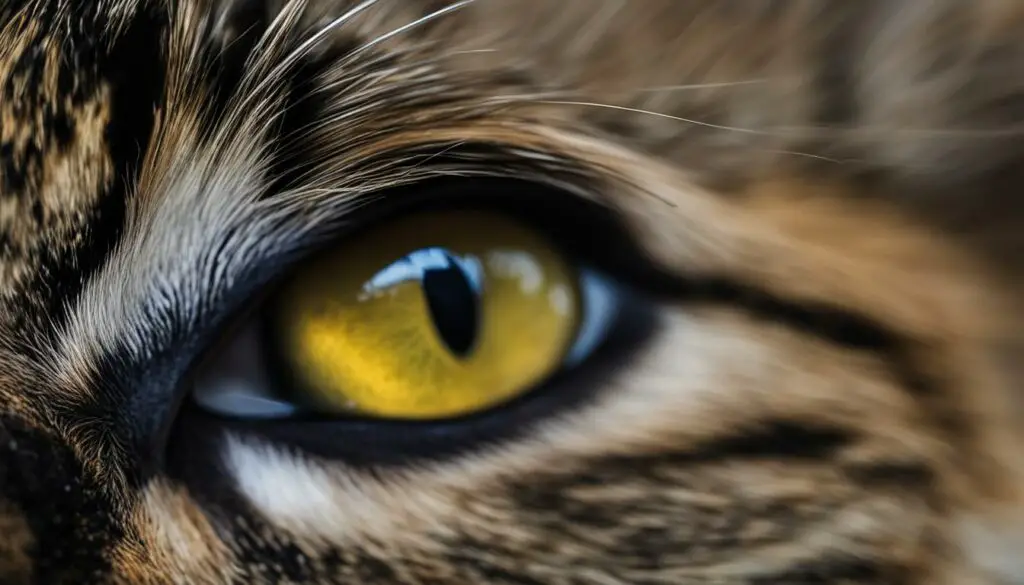
Related Articles
Is it Normal for Cats to Have Eye Boogers?
As cat owners, we’ve all seen those gunky eye boogers that seem to appear out of nowhere. But is it normal for cats to have eye boogers? The answer is yes, to some extent. Small amounts of eye boogers are actually quite common in healthy cats, especially after they wake up from a nap. These eye boogers, technically known as “epiphora,” are a natural part of a cat’s tear production and help keep their eyes lubricated and protected. Certain cat breeds, such as Persians, are more prone to having eye boogers due to their anatomy.
However, it’s important to keep an eye on your cat’s eye boogers. While a small amount is normal, any changes in the amount, color, or consistency of the eye discharge should be monitored and checked by a veterinarian. Excessive eye boogers or a sudden increase in eye discharge could be a sign of an underlying issue, such as an infection, allergies, or an eye injury. It’s always better to be safe and have a professional evaluate your furry friend’s eyes.
In summary, small amounts of eye boogers are normal in healthy cats, especially after sleep. However, any changes in the amount, color, or consistency of eye boogers should be monitored and checked by a veterinarian. Regular observation and veterinary care can help ensure your cat’s eyes are in good condition.
How To Clean Your Cat’s Eye Boogers
Keeping your cat’s eyes clean is an essential part of their overall grooming routine. Regularly cleaning your cat’s eye boogers helps prevent discomfort, irritation, and potential eye infections. Here are some simple steps to effectively clean your cat’s eye boogers:
- Start by washing your hands thoroughly to ensure cleanliness.
- Gently hold your cat’s head in one hand, using your thumb and forefinger to hold the upper and lower eyelids open.
- Take a clean cotton wool ball or a pet-safe eye wipe and dampen it with clean, warm water. Avoid using any chemicals or substances that may irritate your cat’s eyes.
- Starting from the inner corner of the eye, softly wipe outwards along the grain of the fur. Be careful not to apply excessive pressure or touch the eyeball directly.
- If your cat is resistant or uncomfortable during the process, try offering treats or comforting words to help make them feel more at ease.
- Use a fresh cotton wool ball or wipe for each eye to prevent the risk of cross-contamination.
Regular cleaning of your cat’s eye boogers should be done once a week as a part of their grooming routine. However, if you notice an increase in eye boogers or any other concerning symptoms, it is important to seek veterinary advice. Your veterinarian can provide guidance on how to properly care for your cat’s eye health and address any underlying issues that may be causing excessive eye boogers.
Remember, the health and well-being of your cat are paramount, so it is crucial to consult with your veterinarian if you have any concerns or questions regarding your cat’s eye health.
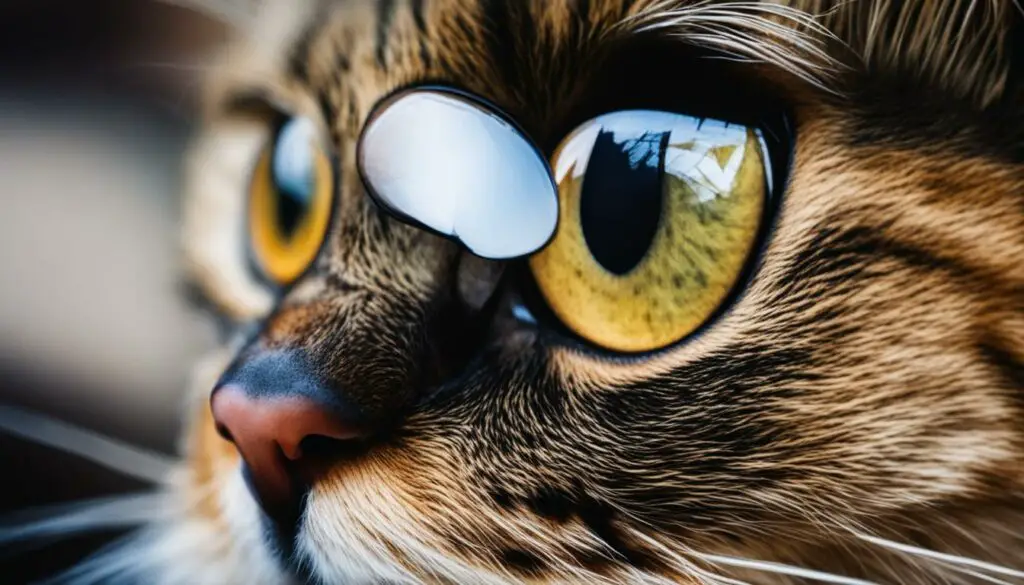
By following these simple steps and providing regular care, you can ensure that your cat’s eyes stay clean, healthy, and free from discomfort. Remember to approach the cleaning process with patience and gentleness to create a positive experience for both you and your feline friend.
When To Call Your Cat’s Veterinarian
If you notice any concerning symptoms in your cat, it is important to contact their veterinarian for professional advice and guidance. While some situations may not require immediate attention, it is always better to err on the side of caution when it comes to your furry friend’s health.
Here are some key indicators that warrant a call to your cat’s veterinarian:
- Increasing eye boogers accompanied by squinting or redness
- Swelling or excessive discharge from the eyes
- Cloudiness of the corneas or vision trouble
These symptoms could be signs of a more serious eye condition that requires prompt medical attention. It is crucial to seek professional advice to prevent any potential complications and provide the best care for your cat.
“Regular check-ups with a veterinarian are essential for maintaining your cat’s overall health and addressing any potential concerns. Don’t hesitate to reach out to your trusted veterinary professional whenever you have questions or notice changes in your cat’s well-being.”
Table: Symptoms That Require Veterinary Attention
| Symptoms | Action |
|---|---|
| Increasing eye boogers | Contact veterinarian |
| Squinting or redness | Contact veterinarian |
| Swelling or excessive eye discharge | Contact veterinarian |
| Cloudiness of the corneas | Contact veterinarian |
| Vision trouble | Contact veterinarian |
Remember, your veterinarian is a valuable resource and partner in ensuring the well-being of your cat. Don’t hesitate to reach out to them with any concerns or questions you may have.
Conclusion
In conclusion, monitoring and cleaning your cat’s nose and eyes are essential for their overall health and well-being. While small amounts of black boogers or eye discharge may be normal, it is important to pay attention to any changes in color, consistency, or quantity.
Regular observation and cleaning can help prevent any potential health issues. If you notice excessive black boogers or a significant increase in eye discharge, it is advisable to consult your cat’s veterinarian for further evaluation.
Remember, gentle cleaning with appropriate materials, such as warm water and cotton wool balls, can effectively remove boogers and eye discharge without causing discomfort to your furry friend. Additionally, it is crucial to maintain good hygiene practices and wash your hands before and after cleaning to prevent the spread of any potential infections.
By staying vigilant and providing regular veterinary care, you can ensure that your cat’s eyes and nose remain in good condition, promoting their overall health and happiness.
FAQ
What causes black stuff in my cat’s nose?
Black stuff in a cat’s nose can be caused by boogers, mucous nasal discharge, dust, scabs, bacterial infection, feline herpes, or Lentigo.
Is cat Lentigo simplex the cause of black spots on a cat’s nose?
Yes, Lentigo simplex can cause black spots on a cat’s nose. This condition is harmless and does not affect the cat’s health.
What are more serious causes of black stuff on my cat’s nose?
More serious causes of black stuff on a cat’s nose include bacterial infections and feline herpes. These may require veterinary attention.
Should I clean my cat’s nose?
Yes, regular cleaning is recommended, especially if your cat has allergies or requires occasional cleaning. However, cleaning should be done gently and only on the outside of the nose.
What should I know about cat boogers?
Cat boogers are dried mucus or discharge that can be found in a cat’s nose. It is important to be extra careful when cleaning the nose to avoid scratching or hurting the cat.
How should I clean my cat’s nose?
Cleaning a cat’s nose is simple and easy. You can use a soft material, such as a cotton ball dipped in clean, warm water, to gently wipe the outside of the nose once a week.
What can I give my cat for nasal congestion?
It is important to consult a vet before giving any medication to a cat with nasal congestion. Plain saline, occasional nose washing, opening windows for fresh air, and using an air purifier can also help reduce nasal congestion.
How should I handle black boogers in cats?
Excessive black boogers in cats can be managed by removing dried mucus, limiting exposure to air, and keeping the cat’s nose cleaned regularly. It is important to be gentle and avoid rubbing too hard.
What about black crust around a cat’s nose?
Gently wiping around the crust with a damp cloth can help loosen it over time and allow it to naturally fall off. It is important to be gentle and avoid poking the cat’s eye while cleaning.
Is it normal for cats to have eye boogers?
Yes, it is normal for healthy cats to have small amounts of eye boogers, especially after sleep. Certain cat breeds, such as Persians, are more prone to having eye boogers.
How can I clean my cat’s eye boogers?
Regular gentle cleaning with water on cotton wool balls or eye-safe pet wipes can help remove eye boogers in cats. It is important to wash hands before cleaning and use fresh cotton wool for each eye.
When should I call my cat’s veterinarian?
If there is an increase in eye boogers along with symptoms such as squinting, redness, swelling, excessive discharge, cloudiness of the corneas, or vision trouble, it is important to seek veterinary advice.
Conclusion
Regular monitoring and cleaning of a cat’s nose and eyes are essential for their overall health and well-being. While small amounts of black boogers or eye discharge may be normal, any changes should be checked by a veterinarian.
Source Links
- https://faqcats.com/what-is-the-black-stuff-on-my-cats-nose/
- https://dailykitten.com/chat/topic/black-kitten-nose-boogers/
- https://cats.com/why-do-cats-get-eye-boogers

